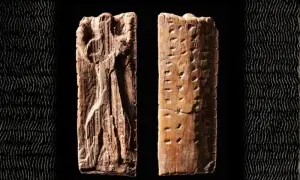Honey, not tonight: Hundreds of Pakistan bee farms swept away in floods
3 min readMorning show after morning show on Pakistani TV and YouTube totka video after video will pledge the benefits and curative properties of honey. Influencers will remind you that the Holy Prophet (PBUH) recommended it centuries ago as beneficial for all sorts of aches and pains. Given the high regard for the syrup we assumed Pakistan would care that its bee population is on the decline.
Sher Zaman Mohmand of the All Pakistan Beekeepers, Traders and Exporters Association says that more than 400 bee farms were washed away in the floods, in which millions of bees have died.
Dr Inamullah, a professor of Agriculture at the University Peshawar, said that bees like moderate weather which is why severe climate affects their productivity. Random rain, wind and other weather conditions have reduced their populations because pollen is washed away in heavy rains and winds. Only 12 types are left in the area.
Small or flora, Domna or large, Swati or mountain bees and European bees used to be part of the chain in Pakistan, but now the Swati bees are becoming extinct. KP used to produce 18 types of honey, including Beira, Palosa, Laachi, Shaftal and Malta, but only eight types remain. Shiftal and Malta are not produced any more.
According to Sheikh Gul Badshah of the All Pakistan Beekeepers, Traders and Exporters Association, 1.5 million people are involved in the business. But these beekeepers are struggling financially.
Thirty-eight-year-old Safirullah of Dalzak Road, Peshawar used to make honey. He now drives a rickshaw.
His 25-year beekeeping for career was sacrificed at the altar of capitalism as deforestation, the climate crisis, floods and the use of lethal and substandard pesticides to protect plants and crops from insects halved honey production in Khyber Pakhtunkhwa.
A few years ago, he used to be able to extract 30kg of honey from one box of bees. This has gone down to 10kg. One box can have between 5,000 and 10,000 bees and a farm has 200 boxes. Fifteen years ago annual production was about 30,000 metric tons but it is one-third now.

The bees have be moved from one place to another according to the season, which is an expensive operation. But because they are not making the same profits any more, the beekeepers drive rickshaws part time to run their households. Two of Safirullah’s brothers have left the work.

The Pakistan Tehreek-e-Insaf government had decided to plant trees with the flora of Billion Tree Tsunami project to increase honey production, but the association said the right trees were not planted.
The rise of fake honey is also denting the market. Real honey is priced at Rs1,200 to Rs2,000 per kg. Officials who peddle cheaper fake honey are ruining Pakistan’s reputation abroad. Beekeepers said they needed laboratories to help identify real and fake honey. Thousands of metric tons of honey used to go from Pakistan go to Arab countries every year, but the fake honey has killed that market’s potential. Pakistani exporters need to break into European and American markets, the association said.
For the latest news, follow us on Twitter @Aaj_Urdu. We are also on Facebook, Instagram and YouTube.



























Comments are closed on this story.